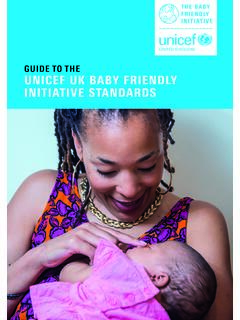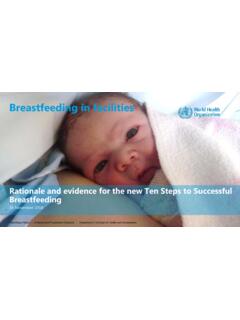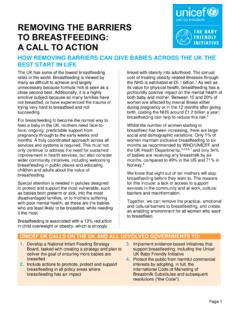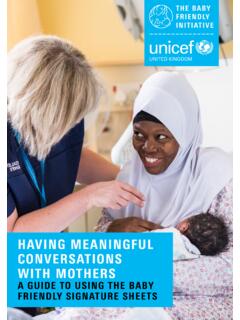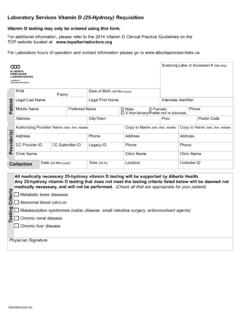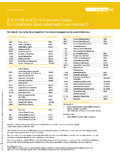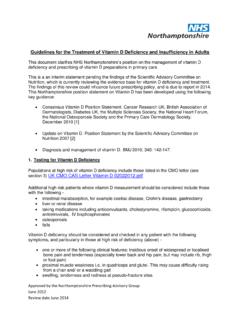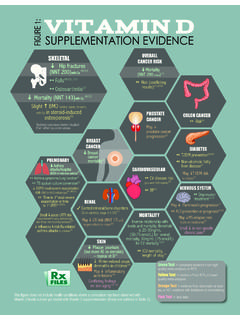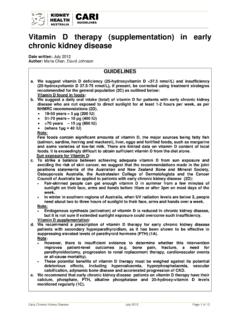Transcription of Vitamin D supplementation for breastfed babies - …
1 Unicef UK Baby Friendly Initiative Statement | Vitamin D supplementation for breastfed babies 1 Updated January 2017 Introduction The whole UK population is at risk of low Vitamin D status due to living much of our life indoors and in a country with limited sunlight. Our main source of Vitamin D is from the action of sunlight on our skin but in countries in the Northern Hemisphere, such as the UK, the sunlight is not strong enough to make Vitamin D in the winter months (September to April). In July 2016, The Scientific Advisory Committee on Nutrition (SACN) updated recommendations on Vitamin D supplementation for the whole population, including new-born babies . It is now recommended that everyone over one year of age should take a 10 g/d Vitamin D supplement daily and, as a precaution, breastfed babies from birth up to one year of age also be given a supplement of to10 g/d Vitamin D per day.
2 babies who are formula fed do not require Vitamin D if they are having 500ml/day of infant formula or more, as infant formula already has added Vitamin D. How can we support pregnant women to take Vitamin D? The National Institute for Health and Clinical Excellence (NICE) and the Scientific Advisory Committee on Nutrition (SACN) recommend that pregnant and breastfeeding women take a Vitamin D supplement of 10 micrograms (or 400 units) daily and that health professionals inform all pregnant and breastfeeding women about the importance of this for their health and the future health of their baby. It is essential that maternal Vitamin D deficiency is prevented and/or corrected during pregnancy in order to prevent babies being born with depleted stores.
3 In some cases pregnant woman may require a higher dose of Vitamin D this should be discussed with her GP. A baby born deficient in Vitamin D will not restore their levels from breastmilk alone. S T A T E M E N T O N V I T A M I N D S U P P L E M E N T A T I O N F OR B R E A S T F E D B A B I E S U N I C E F U K B A B Y F R I E ND L Y I N T I A T I V E I N F O S HE E T Unicef UK Baby Friendly Initiative Statement | Vitamin D supplementation for breastfed babies 2 There are local variations in the provision of Vitamin supplementation available to pregnant and breastfeeding mothers and their infants across the UK in some areas Healthy Start maternal vitamins (which provide Vitamin D, folic acid and Vitamin C)
4 Are provided universally to all pregnant women and infants, whereas in other areas this is only provided free to those eligible through the Healthy Start Scheme. Healthy Start maternal vitamins are the supplement recommended for pregnant and breastfeeding women as other supplements may have a different balance of nutrients added. The current Healthy Start maternal vitamins contain 10ug of Vitamin D, and, where possible, health professionals should encourage their local pharmacies, children s centres and other settings to stock these and recommend their use. Why do breastfed babies need to be given Vitamin D? A new-born baby s Vitamin D status depends on their mother s Vitamin D status during pregnancy and recommendations remain that all pregnant women should take a supplement of 10 g/day during pregnancy and continue to take this when breastfeeding.
5 The amount of Vitamin D in the mother s breastmilk will depend on her Vitamin D intake and Vitamin D stores; therefore, as a precaution, it is now suggested that breastfed babies be given additional Vitamin D as well as their mother. How do we protect breastfeeding? Breastfeeding has a positive impact on the short, medium and long-term health of children and has an important and lasting impact on women s health. Not breastfeeding contributes to infant mortality, hospitalisation for preventable diseases, increased rates of childhood diabetes and obesity, and adult disease. There is a risk that messages around Vitamin D supplementation will give the impression that infant formula is superior to breastmilk because supplementation is not required if a baby is bottle fed.
6 It is therefore very important that health professionals give some thought as to how the message is relayed to parents. Emphasising that the potential problem is related to a lack of sunlight in the UK, not to dietary insufficiencies is important. Also relevant is the fact that it affects the whole population, not just breastfed babies . Explaining that Vitamin D is already added to infant formula, meaning that further supplementation is not needed, is also recommended. It may also be worth mentioning that, whilst there is little evidence of significant Vitamin D deficiency among breastfed babies , the Government is taking a precautionary approach to protect everyone.
7 Keeping the messages clear and simple will aid understanding and encourage uptake. How can we support parents to give their baby Vitamin D? Healthy Start Vitamins for infants currently contain g/d of Vitamin D, as well as Vitamin A and Vitamin C. The new recommended preventative dose is g/d of Vitamin D. Unicef UK Baby Friendly Initiative Statement | Vitamin D supplementation for breastfed babies 3 In December 2016 Public Health England announced that from September 2018 a new product will be available containing the recommended dose of 10mcg of Vitamin D. The children s product will be a 'food supplement' and suitable from birth. The Healthy Start product currently available is licensed as a medicine to be given from four weeks of age.
8 Therefore, any product given to a baby from birth to four weeks, or at a higher dose, should only be given after consultation with a clinician and within the scope of the terms of the licence. Vitamin drops can be given on a sterilised spoon. Droppers are hard to sterilise compared to spoons and there are issues with getting the correct number of drops into the dropper so it is easier to drop the vitamins on to a sterilised spoon. Alternatively, the Vitamin drops can be dropped onto the mothers breast, near the nipple, so that the baby can swallow the drops whilst breastfeeding, however, anecdotally, there could be a risk that babies dislike the taste and so reject the breast.
9 Vitamin drops should not be given to breastfed babies via a bottle with water or flavoured drinks or on a dummy. Local discussions will need to take place, across services, to discuss procurement, storage and distribution of Healthy Start vitamins for children so that all families can access them easily. In some areas these are not available and local arrangements will need to be discussed. All messaging about Vitamin D supplementation should continue to promote, support and protect breastfeeding. What happens if the baby is formula fed? All babies living in the northern hemisphere are vulnerable to low Vitamin D status, as described above; however, infant formula has Vitamin D added as part of the mix of vitamins and minerals that must be added by law.
10 Therefore, babies who receive infant formula (over 500mls per day) do not require any extra supplementation of Vitamin D. However, if a baby is being both breastfed and given infant formula they may still need a supplement of Vitamin D if they have less than 500mls of infant formula a day. Who is at risk of low Vitamin D status? Most of us are able to synthesise Vitamin D through normal exposure of the skin to summer sunlight but, living indoors, in the northern hemisphere and using sun creams increases the risk of deficiency. In addition, some mother and infant groups have been shown to be at increased risk, including: babies of mothers with darker skin types Pregnant and breastfeeding women.


